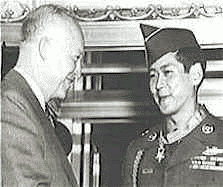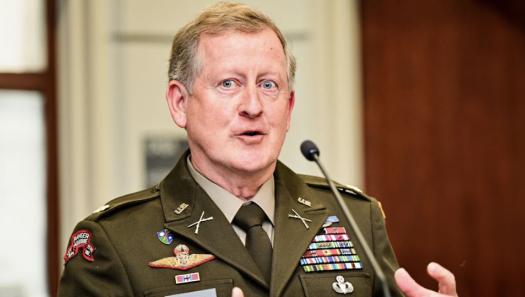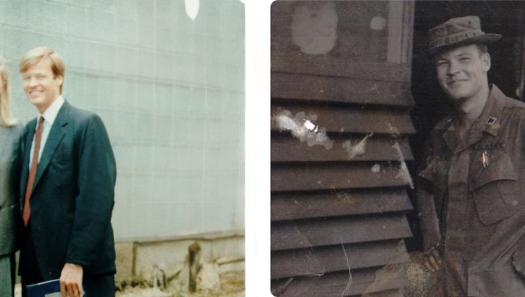Military & Veterans Life
Cover Story: Hiroshi H. Miyamura
Spc. Eric S. Bartelt, Special to the American Forces Press Service

WASHINGTON -- War is a destructive, bleak picture that can make the skies of any canvas gray. For the picture to brighten it takes the heroism of a few ordinary men who look into the face of death, take on the challenges that break most men, and persevere.
During the fighting in Korea, Hiroshi H. Miyamura, a Japanese American, more than survived the bullets and bloodshed of the battlefield only to brave 28 months as a prisoner of war. He is one of the few Americans alive today to have received the Congressional Medal of Honor.
Corporal Miyamura’s story began near Taejon-ni on the evening of April 24, 1951. He and his unit, Company H, 7th Infantry Regiment, 3rd Infantry Division, were occupying a defensive position against Chinese troops on the move.
"After I heard the bugles and saw a flare or two going off, that’s when the firing commenced," said Miyamura, a machine gun squad leader for his heavy weapons company. "I was positioned between two other machine gunners, I had two cases of grenades, an M-1, a carbine and a pistol. I don’t recall how long the guns were firing, but pretty soon, the first gunner came by and said it was getting ’too hot.’ I fired as long as I could until it [the machine gun] jammed on me, then both gunners were gone, then I was there by myself."
Miyamura started throwing grenades and firing his rifle to repel the Chinese who were trying to flank him. "I started shooting at them as they silhouetted across the skyline. I knew the situation was getting bad so I told my men to withdraw," he said. "While they were leaving, I just fired and threw all the grenades that I could. After they left, our own mortars started dropping phosphorous bombs on our position. That woke me up to the thought I’ve got to get out of here."
Hand-to-Hand
He started making his way down the hill when he met Chinese soldiers face-to-face. He brandished his bayonet in hand-to-hand combat and killed 10 Chinese as he tried to make his way back to safety.
"Once I got to the base of the hill, I got caught up in our own barbed-wire entanglement," Miyamura said. "I didn’t know it was set up down there, and I was concentrating on one of our tanks that was getting ready to move. I was waving to him, and that’s when I ran into it (barbed wire). I wanted to get on the other side of the wire so I could get his attention and get out of there, but he didn’t see me."
The battle was just the beginning of Hiroshi Miyamura’s long trek back to freedom.
"I crawled underneath the wire and I ran another 25 to 30 feet, then I couldn’t run anymore because it was a high mountain," Miyamura explained. "I passed out there and, before I knew it, I heard troops going by my position. I was lying face down, but I didn’t move because I didn’t know if they were the enemy or ours.
I heard the noise die down, and then thought I was safe but before I even moved I heard a voice in English saying, ’Get up, you’re my prisoner. Don’t worry, we have a lenient policy. We won’t harm you.’"
Miyamura then first realized he was injured when he tried to get up. He’d received leg wounds from grenades -- not bad enough for him to notice while trying to get free, but enough to cripple him while walking after he was captured. The enemy took him to a rear area where other wounded men from his company were being held.
"We didn’t have any medical assistance from the Chinese. We had to doctor our own wounds," said Miyamura. " We helped each other out."
However, for Miyamure and the other POWs, tending to their wounds would become the least of their worries over the passing months.
"I never had any side effects from my wounds, but I had dysentery almost the first month or so because we were drinking water that wasn’t good for our systems," he said. "We weren’t allowed to boil water during our march because we had to make a certain number of kilometers a day. The only time we could boil water was during our stops at night."
Miyamura recalled how they would travel from one village to the next, where another group of guards would be waiting to take them. During that time, the Chinese would ply them with communist propaganda, and the interpreters, some of whom were educated in Russia, spoke English well.
The trek and the lack of adequate nourishment wore down some of the soldiers, many of whom were very young.
Starvation Diet
"I was exhausted and so hungry, and I almost gave up," he said. "We were each given a sack, about two or three inches in diameter, and about 2-1/2 feet long that we had to carry on our marches. That was our ration for one week. It consisted of finely ground barley and rice. We were told to grab the whole of the grain, put it in our mouth and wash it down with water."
Nevertheless, many of the younger soldiers refused to eat and starved. Some died because they lost the will to live. However, Miyamura would not give in to despair.
"I didn’t want to think about what was happening," he said. "I wanted to concentrate on raising a family once I got home. I think that’s what kept me going."
Back home in Gallup, New Mexico, his family didn’t know if he was dead or alive.
The Army had sent them a letter that said only that Miyamura was missing in action. His family did not hear any word of him for a year.
During World War II, Miyamura had been a member of the famed Japanese-American 442nd Regimental Combat Team. He didn’t see fighting, however, because he was too young to ship overseas. Then he suffered a hernia. By the time he recovered from surgery, the war was over. He was in the Army Reserve when the fighting in Korea broke out.
Rumors to Pass the Time
The days in captivity passed into months and the months passed into more than two years. "For over a year we heard rumors that we were going to go home, that peace talks are going well. Then the next thing we would hear is that they are not going well," said Miyamura. "It got to the point later that we thought we would never be released."
But on August 23, 1953, he and his comrades were repatriated at Freedom Village near Panmunjom.
"To this day I don’t remember crossing the bridge at Freedom Village," said Miyamura. "All I can remember is seeing a big U.S. flag flying in the breeze, and I just concentrated on that flag. After a short period of relaxation, I was escorted to a room where I met a reporter from my hometown and Brigadier General Ralph Osborne, commander of the 3rd Infantry Division. He told me that I was to receive the Medal of Honor."
Miyamura was overwhelmed. “I didn’t feel I was doing anything out of the ordinary. I felt I was just doing. Even today I’d rather be in the background then sit out in front," he said. "The medal is very humbling, and I’m very honored to have received it for what I did."
The citation for his medal was signed by President Harry S. Truman in 1951, but was kept secret until his release because of fear the Chinese would retaliate against him for his part for killing so many of their soldiers. Miyamura received his Medal of Honor on October 27, 1953, from President Dwight D. Eisenhower at a White House ceremony. He was only the second Japanese-American to have been accorded the nation’s highest honor for valor.
Miyamura went home to Gallup. He and his wife, Terri, started a family. Today, they have three children and four grandchildren. He worked as an auto mechanic, a skill he picked up during his high school years.
Today, Miyamura said, he feels South Korea is free because of the sacrifices made by the men who gave their lives and who put their lives on the line.
(Spc. Eric S. Bartelt wrote this article for the July 2000 issue of KorUS magazine, published by U.S. Forces Korea in Seoul, Republic of Korea. The military journalist currently is assigned to the 40th Public Affairs Detachment at Fort Campbell, Kentucky.)
SOURCE: American Forces Press Service via Veterans News & Information Service


